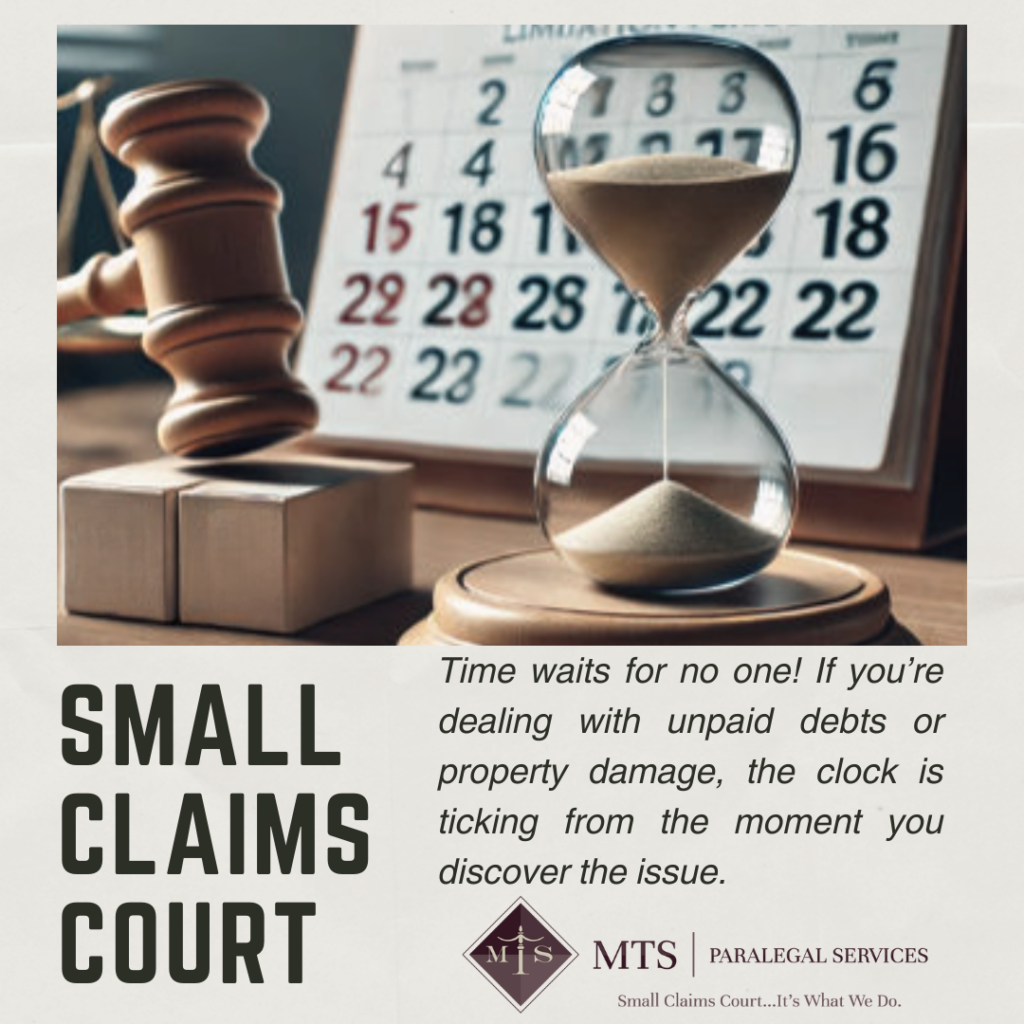
Understanding the Limitation Periods for Filing Small Claims in Ontario
When filing a lawsuit in small claims court in Ontario, it’s critical to understand the importance of limitation periods. These legal deadlines can significantly impact whether a case can move forward. Small claims court is designed to handle disputes involving amounts up to $35,000, covering issues like unpaid debts, damages to property, or breach of contract. However, no matter how valid your claim may be, it must be filed within the designated time frame, known as the limitation period. In Ontario, this limitation period is generally two years, but there are exceptions. It’s important to know how this applies to your case, so you don’t risk losing the opportunity to pursue justice.
What is a Limitation Period in Small Claims Court?
A limitation period is the time limit within which a legal action must be commenced. In Ontario, this time limit is usually two years for civil matters, including those filed in small claims court. This means that from the date you first discovered the problem – such as an unpaid invoice or damages to your property – you have two years to file a lawsuit. Once this limitation period has expired, you may lose the right to take legal action entirely. It’s not uncommon for individuals to assume they have more time, only to find out too late that their claim is no longer valid. That’s why understanding this aspect of small claims court is essential. Being mindful of this deadline can ensure your rights are protected.
In small claims court, claims are generally resolved more quickly than in higher courts, but this speed doesn’t negate the importance of filing on time. You may have a strong case, but if you miss the limitation period, the court will likely dismiss your claim. So, if you’re dealing with a financial dispute, damage to your property, or any other civil matter that falls under small claims court jurisdiction, it’s crucial to keep the limitation period in mind.
How the Limitation Period Works in Small Claims Court
The two-year limitation period for small claims begins when you become aware of the issue that leads to your claim. For example, if you’re seeking to recover unpaid debts, the limitation period starts from the date the debtor fails to make payment. Similarly, in cases of property damage, the clock starts ticking from the moment the damage occurs. It’s important to mark this date because even the strongest case can be dismissed if filed outside this window.
Ontario’s small claims court handles disputes up to $35,000, and the limitation period is the same for this court as it is for larger courts. This rule applies to various types of disputes, whether you’re seeking payment for services rendered, damages for property loss, or compensation for injuries. Small claims court is designed to provide a simpler, more accessible avenue for legal resolution, but the rules around limitation periods remain strict. Missing this deadline can result in your case being thrown out, regardless of its merits. Therefore, it’s vital to calculate the limitation period correctly and ensure you act within that time frame.
Exceptions to the Limitation Period in Small Claims Court
There are exceptions to the general two-year limitation period in small claims court that may apply to your case. These exceptions often arise in situations involving minors or individuals with disabilities. If the person involved in the dispute is under 18 years of age or legally incapable of managing their affairs, the limitation period might not start until they reach adulthood or regain the capacity to manage their affairs. This can extend the time available to file a claim, offering more flexibility under specific circumstances.
Another key exception occurs in cases of fraud or concealment. If the party responsible for your damages or debt has actively concealed their wrongdoing, the limitation period may be extended. This means that the two-year window to file a claim may start only when the fraud or concealed action is discovered, rather than when the original event took place. Tim must be aware of these exceptions, as they can significantly affect the time available to take action. However, such exceptions are rare and should not be relied on unless there is clear evidence that they apply.
Legal Assistance is Key to Meeting Limitation Periods
Contact Tim at MTS Paralegal Services for expert legal assistance in navigating limitation periods. Filing a claim in small claims court can be daunting, especially with the complexity of these time limits. Misunderstanding the rules could cost you the opportunity to pursue your claim. If you’re unsure about whether you qualify for an exception or how to proceed, it’s crucial to get legal advice from Tim to ensure everything is handled correctly.
For those unfamiliar with the legal system, navigating small claims court is challenging. Tim at MTS Paralegal Services ensures your claim is properly filed within the prescribed time frame. Whether you’re dealing with an unpaid debt, property damage, or any other civil issue, the right guidance from Tim can make all the difference in achieving a successful outcome.
This content does not constitute legal advice. For up-to-date guidance or legal advice specific to your situation, please contact MTS Paralegal Services Professional Corporation or call (226) 444-4882.
